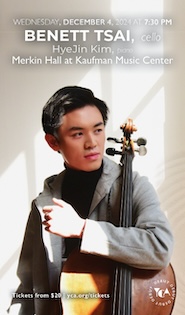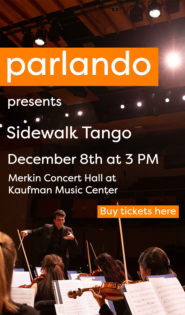Romanticism rises from the ashes, magnificently, with Thielemann, Vienna Philharmonic

Listening to Richard Strauss’s Eine Alpensinfonie, as excellently performed by the Vienna Philharmonic under Christian Thielemann in Carnegie Hall Friday night, one couldn’t help thinking: The Romantic era in music didn’t go quietly.
The hall’s performing platform—so big it has its own name, the Ronald O. Perelman Stage—was stuffed with musicians to the point where a traditional European-style orchestra entrance might have taken half as long as the piece. So they pre-positioned the 18 brass players before strings and winds scuttled to their places amid applause.
Strauss is known for his sunrises (think Also Sprach Zarathustra). His daylong (metaphorically speaking) “Alpine Symphony” includes both a volcanic sunrise and a colorful sunset. There were those at the work’s 1915 premiere who found this piece already old-fashioned, a sunset for Romanticism before the dawn of Schoenberg’s “method of composing with the twelve tones” and Stravinsky’s, well, you name it.
Schoenberg himself had a Romantic-sunset stage as a 25-year-old composer with his string sextet Verklärte Nacht, which, as they say, opened for the Strauss on Friday’s program in the composer’s arrangement for string orchestra. On this night of robust Romanticism, the Vienna strings alone shook the floor with their passionate fortissimos.
In fact, all this musing on musical styles and eras is made possible by the fact that this ensemble and conductor gave a critic so little to criticize. The capacity audience at Carnegie came to hear authoritative interpretation, and they got it. Thielemann has recorded the Strauss at least three times going back to 2000, twice with this orchestra. The composer himself conducted the piece with the Vienna Philharmonic in the year of its premiere.
And of course the Vienna players did right by the founder of the Second Vienna School, depicting in Verklärte Nacht a lovers’ dialogue that breathed and swelled in long arcs and the smallest details. And all-strings did not mean all one tone color; in the opening bars alone, silky violins were complemented by flute- and clarinet-like timbres from other sections.
Concertmaster Rainer Honeck’s extensive violin solos were the heart of the music, agitated one moment and serene the next, floating sweetly above affirmations in the low strings as the players closed the piece in multiple shades of pianissimo. Thielemann, who had led the work with minimal gestures, bounded off the podium at the end and clamped a hug on his concertmaster, then had to return to the stage three times to acknowledge the continuing applause—a response to a program opener that was itself old-fashioned, by 2023 standards.
According to one account, a critic at the premiere of Eine Alpensinphonie called the work “cinematic.” This seeming anachronism for 1915 suits the piece to a T now, especially given Strauss’s influence on film composers from Max Steiner to John Williams. In its seamless flow of 22 sections depicting an eventful day of mountain climbing, the piece deserves an Oscar for editing and another for cinematography.
And maybe the Best Director award should go to conductor Thielemann, for his astute pacing of all the score’s scenes, from the mountain’s unseen presence in the opening “Night” (soft but massively rich brass) to the triumphant vista “At the Summit” (ablaze with orchestral color) to the perilous descent through a storm (piccolo lightning and percussion thunder) to nightfall and rest. He saw to it that all of Strauss’s special effects along the way—a sparkling percussion waterfall, woodwind water drops, pizzicato wildflowers, and actual cowbells in an imaginary pasture—delighted the listener’s ear and inner eye.
This being a piece as much about psychic states in nature as nature itself, the conductor made sure one experienced fully the confident stride of “The Ascent,” the confusing modulations when the climber is lost in “Thickets and Underbrush on the Wrong Path,” and the luscious intonation of the brass in triumph at the mountaintop and in repose at the end. Once again, concertmaster Honeck’s solos stood out from the large ensemble, as if spotlighting the lone hiker confronted by the sheer massiveness of Alpine nature.
Some overenthusiastic fans burst in on the work’s pianissimo close with applause, but ceased when the conductor didn’t budge from his final stance. Finally he gave the nod, and an Alpine storm of applause broke. Dispensing with multiple callbacks, Thielemann returned once to the stage and led the ensemble in an exquisite little waltz encore, as if to say, Romanticism may have left the building, but romance hasn’t, and Wien ist immer Wien.
The Vienna Philharmonic series at Carnegie Hall, conducted by Christian Thielemann, continues with works by Mendelssohn and Brahms 8 p.m. Saturday, and Bruckner’s Eighth Symphony 2 p.m. Sunday. Concerts listed as sold out; inquire for late availability. carnegiehall.org; 212-247-7800.


Posted Mar 05, 2023 at 10:42 pm by Diana
Thank you for your review! Did you recognise the encore? I’m hopelessly trying to find it 🙂
Posted Mar 24, 2023 at 1:04 pm by David Wright
According to Carnegie Hall management, the encore was Entr’acte Valse by Joseph Hellmesberger (Sohn).